Imagine building your dream home. You’ve picked out the perfect plot of land, the finest materials, and a general contractor. To start the building process right away, you’ve decided to skip the blueprint. It’s straight to breaking ground with the hope that it will all work out for the best. 🤞
Of course, no one would build a home without a blueprint or a plan! So, why would you tackle blogging without a content strategy and clearly defined business blogging goals?
Obviously, you can’t achieve goals until you’ve identified them. Plus, you need to understand the business reasons WHY you are blogging—aka your goals and objectives—to guide WHAT you are blogging about. Otherwise, you’ll end up with random blog topics that won’t necessarily attract your target audience or align with your offers. 🤦🏻♀️
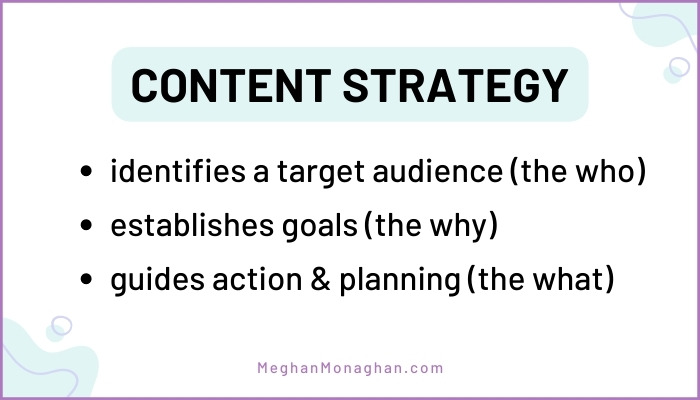
No strategy and no blogging goals means ineffective content marketing. The result? Blogging that’s not profitable.
So, are you ready to do a little content planning? You won’t regret it!
In this article, I’ll lay out some of the common goals for a business blog. Then, you can modify them to meet your own needs. If you’ve felt your content is a bit haphazard or disjointed, this is your moment to get things in order.
Together, we’ll start making your blog a functional, strategic, and effective tactic for your business!
Identify WHY you're blogging to guide WHAT you're blogging about.Click To TweetWhat is Business Blogging?
Business blogging is the marketing tactic of using blog content on your website to support business growth by:
- improving search ranking and visibility;
- attracting new leads and prospects;
- positioning you as a credible, trustworthy brand; and
- helping you to increase sales.
Although not a quick win, business blogging has loads of benefits. It is a proven tactic to achieve business growth as part of a long-term content marketing strategy.

Business Blogging Goal #1: To Attract Qualified Leads and Prospects
No matter what you hear, blogging is still an effective way to transform website visitors into leads or prospects. And, to be profitable, you need to generate leads, right?! So yes, this is a biggie when it comes to reasons why you’re blogging for business.

Here are some statistics from DemandSage about blogging that suggest it supports lead generation:
- 55% of B2B markets think blogs are the best for moving potential clients through the sales funnel.
- B2B marketers that implement blogging gain 67% more leads than their counterparts that do not blog.
- B2C companies who blog generate 88% more monthly leads than those that do not.
- 55% of brands gain new clients due to blogging.
- A Hubspot study of 2,300 marketers revealed that brands with a dedicated blog experience a 126% higher lead growth.
- Half of the people who arrive at a brand’s blog are more likely to convert as compared to people coming through organic traffic.
Think of your business blog as a magnet for your ideal customer. When you create content that is super relevant to your target audience AND to your offers, your blog has the potential to attract more qualified leads. The more qualified, the better since these people have a higher likelihood of becoming a customer.
With lead generation as an objective, be sure to offer website visitors a way to express interest! This is commonly achieved by offering a quick win via a lead magnet, such as a:
- Free document or video
- Consultation call
- Demo
- 30-day trial
- Discount coupon
- Low dollar digital product
This process is a way to collect interested people’s contact information so that you can follow up with them in the future via email after they’ve left your website.
Speaking of email…
Business Blogging Goal #2: To Build an Email List of Engaged Potential Customers
Harnessing the power of blogging to create a thriving email list isn’t just a goal—it’s a game changer for your business.
First of all, 95% of the people who visit your website will never return again. A fleeting interaction and then they are lost forever! Ouch. (Check your Google Analytics to see what I mean.)
So, getting tons of website traffic doesn’t mean much by itself. You need a plan to grab an interested party’s contact deets before they are adios amiga! And that’s where email list building comes in.
By capturing an email address, you gain a chance to initiate a meaningful conversation beyond the confines of your website. Plus, you can build rapport and cultivate trust over time by emailing your list regularly.
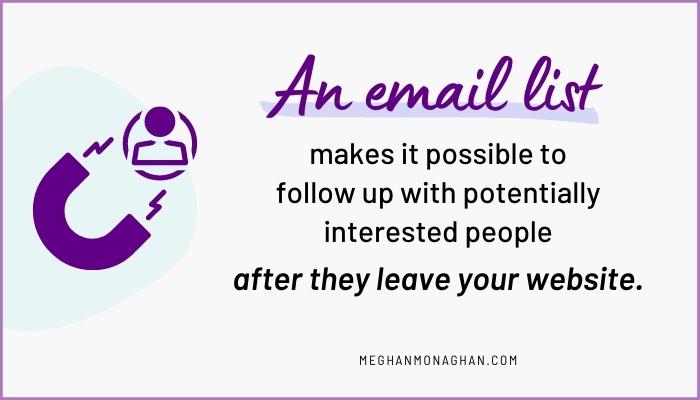
And, check out these impressive email marketing statistics:
- For every dollar invested, a staggering $42 is the return
- 99% of email users check their email daily
- 4 out of 5 marketers said they’d rather give up social media than email marketing
By the way, I’m with those 4 marketers! While social media platforms give you a place to connect, they control the rules and dynamics. On the other hand, an email list is a relationship YOU own.
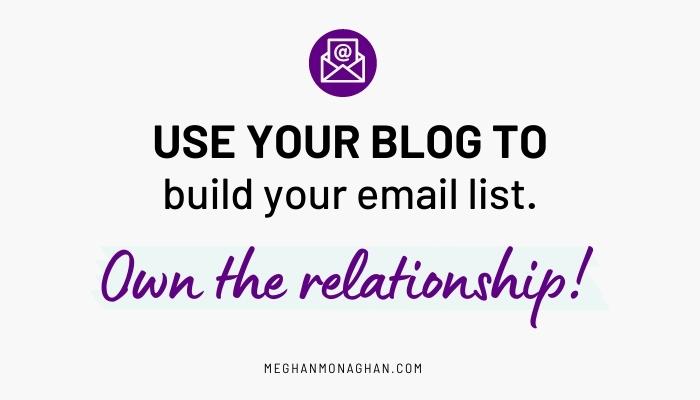
Moreover, the duel between email and social media has a clear victor when it comes to sales and communication. Emails boast a higher ROI, enjoy better visibility, and have a higher conversion rate. (Yes, please, I’ll take some of that! 💃🏻)
Well, we’ve already established that your blog is great for lead generation, so by definition it’s also good for supporting email list growth.
Therefore, as long as you have an email marketing game plan ready, then this is another business blogging goal that can lead to profitability.

Business Blogging Goal #3: To Improve Visibility and Ranking in Search Engines (aka SEO)
Do you need more people to discover your business? Then using a blog to achieve a higher position in search engines makes sense.
When done well, blogging leads potential clients right to your business’s virtual doorstep, paving the path to higher profitability. At its core, Search Engine Optimization (SEO) helps to shine a spotlight on your brand in search engines like Google, Bing, and DuckDuckGo.
Think about it this way: If your brand were a book in a gigantic library, wouldn’t you want it to be easily found and picked up by readers?
Nowadays, search engines are the online libraries. People search online for answers when they have questions or face challenges. In fact, in 2023 most buying journeys begin online, with at least 46% starting with a search engine like Google. (Some research suggests even a higher percentage.)
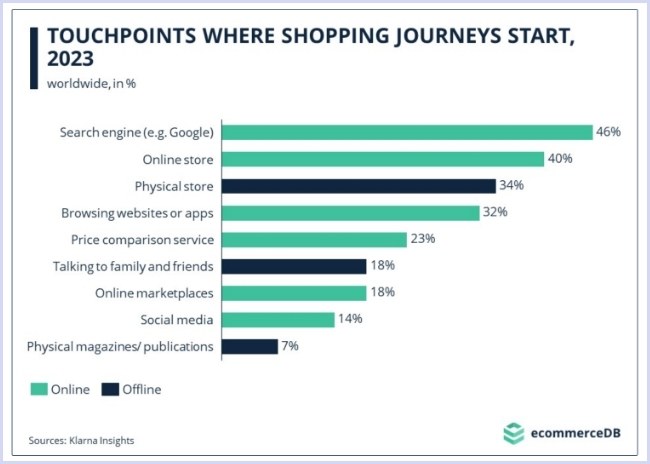
While optimizing content for search engines can get complex, the essence is simple: blogging increases your visibility in searches.
Here’s an example from my own business.
This post that you’re reading was first published in July 2017. It ranked on page one of Google in spot #3 as of May 2021.
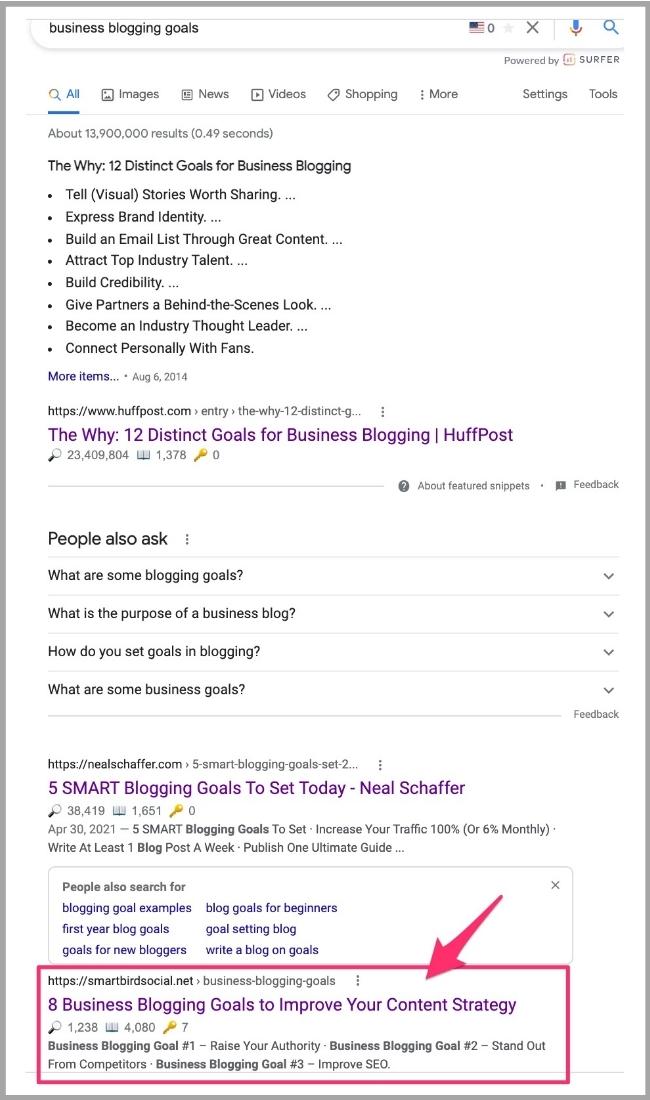
Then I updated this post in August 2021. And, it’s kept that #3 position as of October 2023.
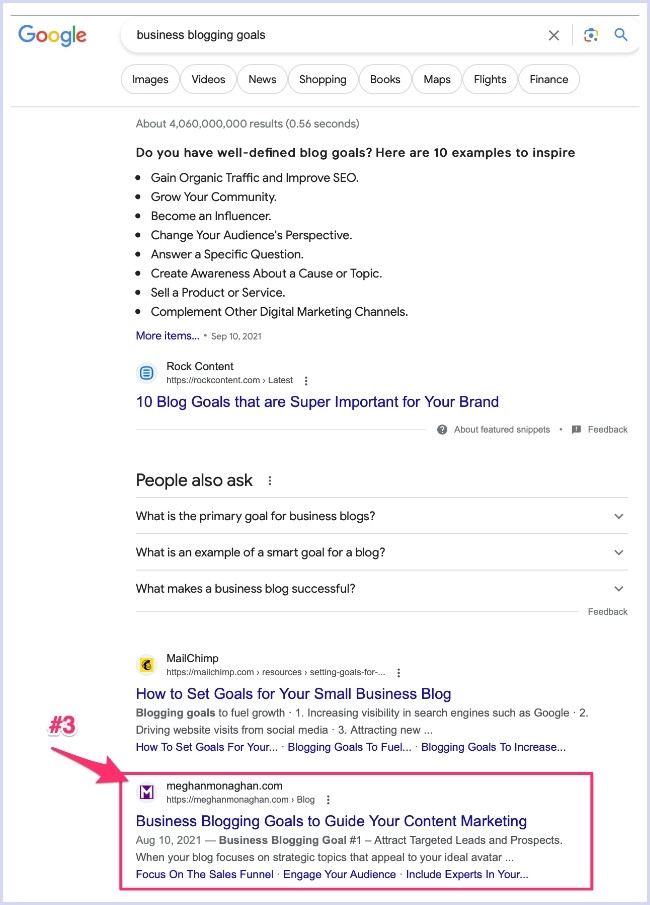
Not only is the article ranking high in Google, it’s also one of my top 10 pages.
And that’s an example of organic SEO blogging working to improve online visibility so that new people can discover your business when they seek answers to questions.
In my opinion, improving your SEO is definitely one of the top 5 business blogging goals to have. But it’s a long-term goal: Only 5.7% of pages will rank in the top 10 search results within a year of publication.
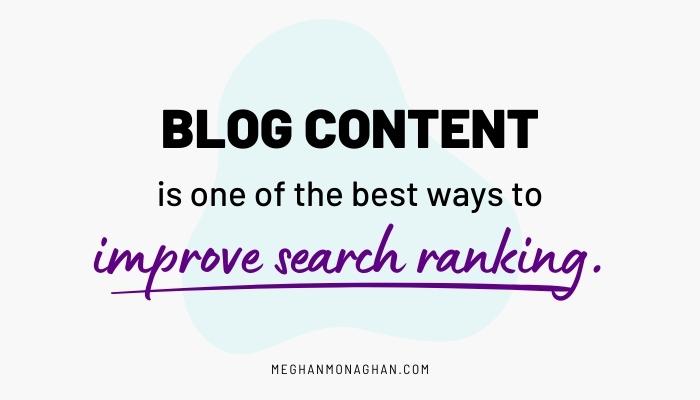
Business Blogging Goal #4: To Increase Website Traffic/Visitors
As your SEO improves and your site appears higher on search engine results pages, more people will find you. With the right blog content strategy, you’ll most likely attract more people to your website by giving them a reason to click on that description on the Search Engine Results Pages (SERP).
Identifying “more website traffic” as a blogging and content marketing goal is common. However, I have a word of caution.
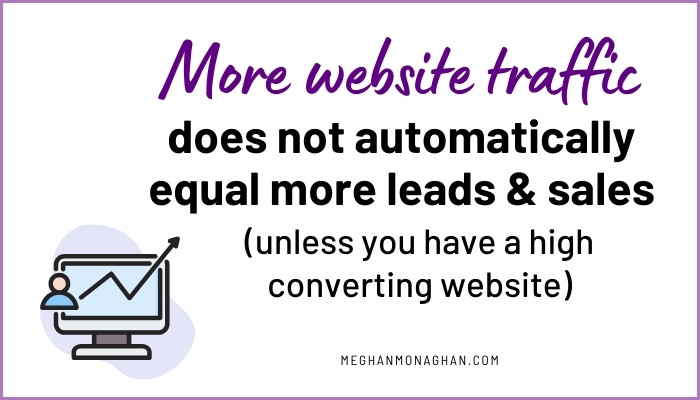
Don’t get too caught up in website traffic as a standalone goal or as a measurement of success. More visitors does not automatically equate to more leads and sales—unless your website has a high conversion rate.
That said, website traffic may be an appropriate blog goal for your business.
After all, blog content gives people a reason to visit your site. So, it’s a good way to attract website visitors and generate interest and clicks without paying for ads. As you’ve probably experienced yourself, articles are often more enticing than products and services pages.
Plus, people still read blogs! In fact, a small survey of 325 people found that all but 17% of the respondents consume blog content.
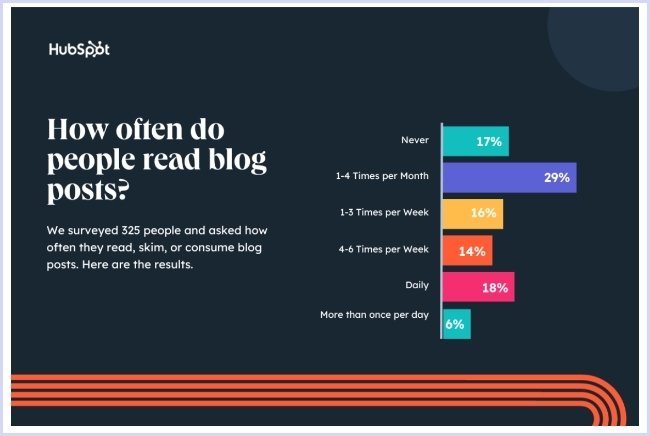
And, even more promising news is that 57% read the same amount of blogs as last year while 35% read more!
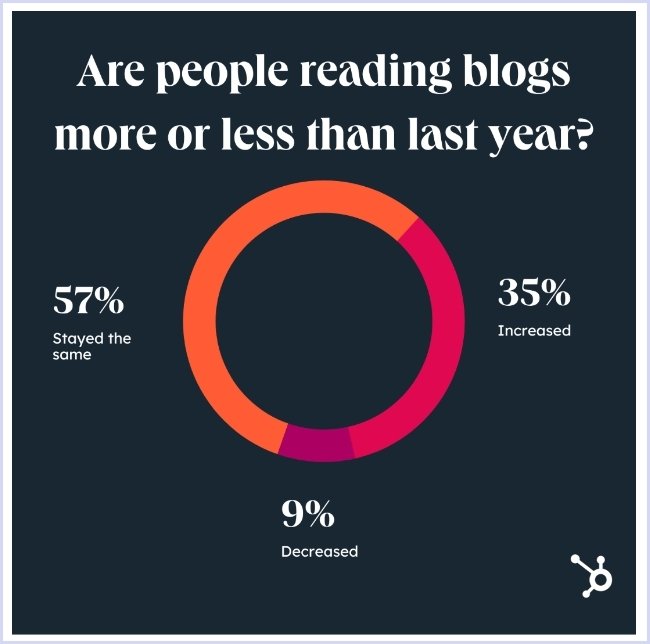
Therefore, blogging remains an effective way to attract website visitors organically. In fact, Hubspot uses blogging to get to #1 in search, and it’s the company’s primary source of traffic. It says that:
“…a significant percentage of HubSpot customers first stumbled upon our brand and our website through our blog – usually by searching for something on Google and clicking on one of our blog posts.”
You know, it just makes sense that blogging increases website traffic. It creates more pages and more current content on your site to attract potential customers and search algorithms!
Websites with blogs attract more visitors and usually rank higher in search engines.Click To TweetBusiness Blogging Goal #5: To Turn Casual Browsers Into Excited Buyers
A business blog doesn’t have to be a platform only for sharing information. Think of it as an experience that can guide website visitors through a well-laid out journey—from awareness to purchase to loyal brand advocacy.
Consider each blog post as a stepping stone to the next stage in the buyer’s journey. Rather than isolated pieces of content, your blog topics should serve as coordinated milestones that walk each person through what they need to know before making a purchase decision.
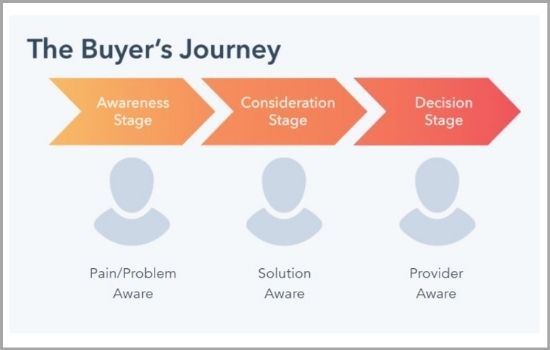
Ideally, you move this person to your email list where you set up a campaign that leads them to a buying opportunity. But, before they ever give you their information, it helps to address the decision making process with blog content.
Why is this goal paramount? A systematic, conversion-focused content approach not only bolsters sales but also crafts more intentional and interconnected content journeys. It’s about creating a symphony, not just hitting individual notes!
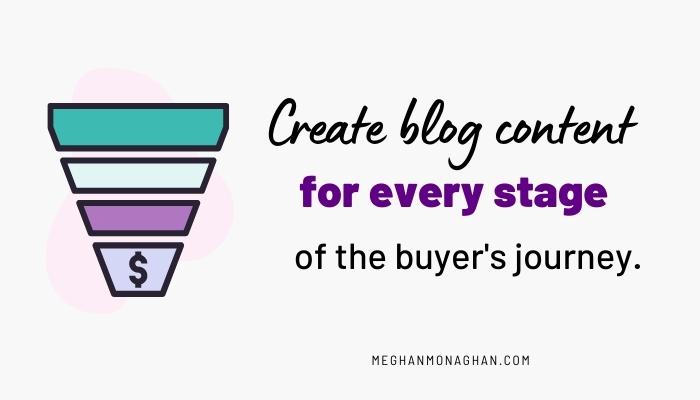
Pssst…if you need help with crafting content for the buyer’s journey, check out my podcast episode about it:
If you’re skeptical that blogs inspire sales, I don’t blame you! But a study of 300 consumers revealed that 56% had purchased something from a company after reading a blog post. Not too shabby!
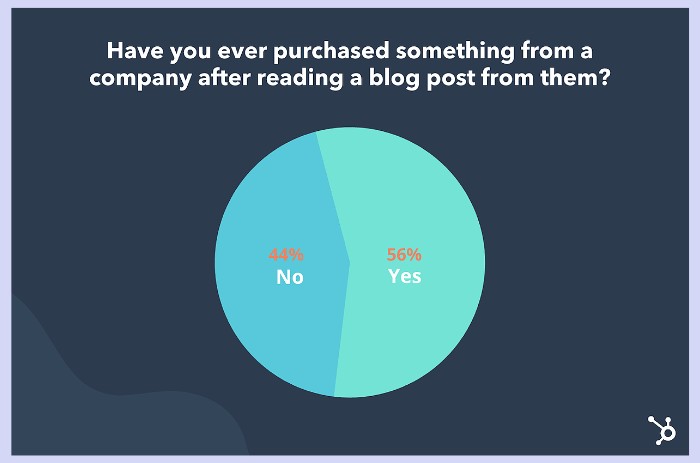
Here are a few other statistics about the ROI of blogging:
- 55% of B2B markets think blogs are the best for moving potential clients through the sales funnel.
- Marketers who prioritize blogging have a 13x greater ROI.
- 55% of brands gain new clients due to blogging.
Thus, boosting your sales conversions is a realistic, achievable business blogging goal! However, you will need to align your posts with your offers and be deliberate in creating content that is not only informational but persuasive. (Copywriting will be the key to transform browsers into buyers.)
Business Blogging Goal #6: To Stand Out From the Competition
Online content is like grains of sand on a beach…millions of tiny specks that all look about the same from a distance. Therefore, when it comes to your blog, merely being present isn’t sufficient, especially if you’re in a crowded industry. You’ll blend in and get overlooked unless you do something different.
What differentiates you from the competition is brand messaging and your original, custom content. After all, your content embodies and expresses Y.O.U. (Your Original Uniqueness). And, you’re one of a kind!

Creating content that expresses Y.O.U. is a business blogging goal that can boost readership and give your brand a distinct voice.
Your content isn’t just words—it’s the embodiment of your brand’s originality. This authenticity is important since it fosters the “know, like, and trust factor,” which drives sales. The public knows only what you share with them. It’s wise to give readers a perspective on how you differ in the marketplace.

Whether it’s groundbreaking insights, customer triumphs, or personal anecdotes—infuse distinctiveness in your blog. Offer a fresh perspective. And, be sure to humanize your AI content. Otherwise, your brand could come across as predictable, boring, or commonplace.
Unfortunately, “standing out” is a goal that’s challenging to measure. Yet, it may be worthwhile if you’re facing a lot of competition in a specific industry. You may be able to gauge your success on factors like PR/media coverage or positive social mentions.
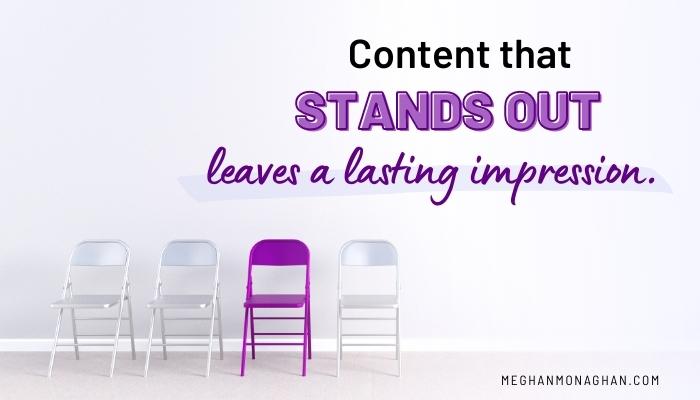
The key is to connect on a personal level with your audience. If you accomplish this, then you’ll know it because your sales numbers will rise!
Business Blogging Goal #7: To Establish and Elevate Your Authority and Credibility
People want to buy from businesses they trust. What’s more, they want to feel that they’re dealing with an industry expert.
Your blog is an excellent Authority Hub where you assert yourself as an expert in your niche. Communicating a sense of authority to your readers inspires trust and confidence in you and your offers, which is important to persuading people to buy.
“Establishing yourself, then, as the authority in your field is how you can dominate your competition. It positions you above others and opens doors, which is the most important responsibility of any business owner/CEO: to acquire and retain customers.” – Adam Witty, CEO, Advantage Media Group (Source: Entrepreneur magazine)
Publishing Authority Content on your business’ blog conveys your expertise and experience while also increasing customer confidence.
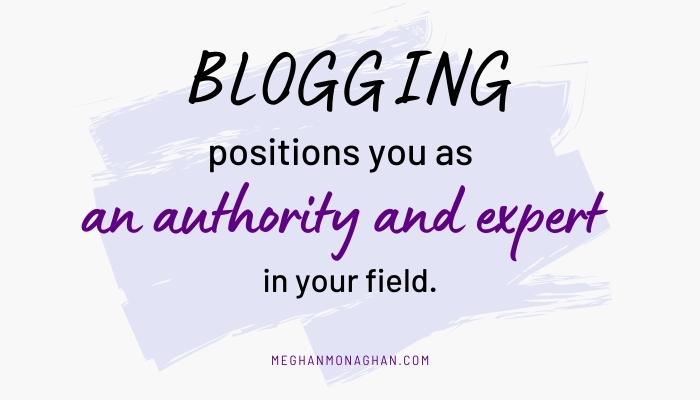
To prove credibility, weave customer stories and personal anecdotes into your posts. Showing your products or services in action and getting results makes you far more believable. Prospects can see your ability to solve their most pressing problems.
After all, how people perceive you is reality. And, it’s up to you to influence that perception with content that supports your authority and position. If you don’t, people will be forced to fill in the blanks on their own, which doesn’t necessarily work in your favor.

You need to craft your own narrative, which is why this can be a really critical business blogging goal, depending on your type of business.
An added benefit of increasing your brand authority is that you can also position yourself as a thought leader. By covering relevant topics in an exceptional way or from a different perspective, you’ll outshine others in your niche.
Business Blogging Goal #8: To Gain Insight and Gather Feedback
Understanding the needs and wants of your target audience isn’t always easy. Therefore, one of your business blogging goals may be to gather more insight and feedback from your community.
A blog gives you a chance to learn more about your ideal customer and their pain points. You can measure your posts’ performance and get direct and indirect feedback through social shares, comments, website traffic, and clicks via email.
Additionally, you can analyze what topics are resonating to guide your content strategy as well as discover what products and services that people want. A blog can also help guide where to put your resources and what to skip when it comes to marketing.

With gaining insight as a blog goal, it’s critical to engage with your audience. Be proactive! Do things such as:
- Ask questions and encourage responses through comments or email.
- Involve fans by asking for user-generated content.
- Encourage people to suggest possible content topics.
- Create interactive content like quizzes to increase interest and help you gather feedback in a fun way.
Blogging facilitates an avenue to communicate with potential customers. It creates the opportunity for engagement and talking points. It also helps you see what’s working and what’s not.
By the way, your target audience can learn a lot about you and your business through a blog! Website visitors will draw their own conclusions about you and your business from the quality of your blog.
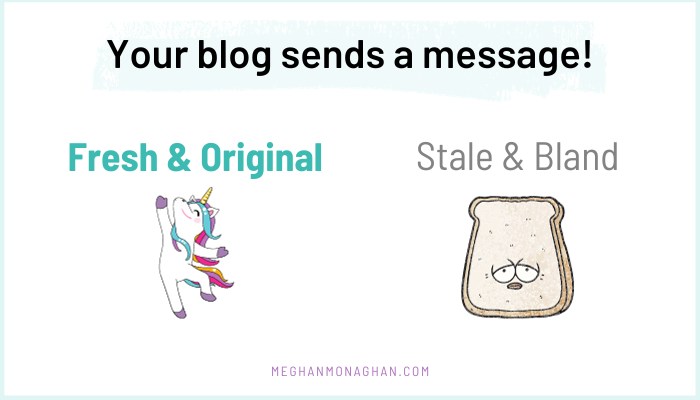
When someone sees you’ve been publishing fresh, original articles regularly, your commitment is obvious. On the flip side, a stale blog that doesn’t show much effort sends a different message and may discourage people from engagement.
So, commit to quality content and regular publishing if you expect to use blogging as a tool for audience insights.
Business Blogging Goal #9: To Increase Affiliate Commissions
The monetization strategy of those who blog for a living (aka “bloggers”) is often to make money from affiliate sales. For example, a blogger recommends products or services to their target audience. Then, when people use their link to buy, the blogger receives a referral fee.
Although you’re using your blog to promote your business, why not also include affiliate links as part of your content strategy? If this sounds good to you, then you’ll want to make that one of your blogging goals.
Affiliate marketing is the process of earning a commission by promoting another company’s product (or service). You find a product, promote it to others, and earn a piece of the profit for each sale that you make.
As a business, you use a lot of different tools in your daily operations. And, guess what? Some of these tools may benefit your audience too.
Your blog is the perfect place to share more about products or services that can help your community. That makes it a great opportunity to become an affiliate partner for these items so that you can receive a fee for referring customers.

Just remember that it’s your brand and reputation on the line. Suggesting that a valued prospect try something that isn’t vetted by you or your team could result in diminished trust if things go awry.
I suggest recommending products and services you’ve personally used. Be particular, and choose affiliate opportunities that align with your business and brand.
And, if affiliate marketing is a blogging goal and a big part of your revenue, have a detailed content plan to maximize your promotional opportunities. Affiliate links here and there won’t have as much impact as more detailed tutorials, how-to’s, in-depth guides, and promotional spots for affiliate products.
Business Blogging Goal #10: To Expand Your Opportunities Beyond Customer Acquisition
A successful blog attracts more than potential customers. It can open doors to plenty of other profitable business opportunities!
Once you have an established blog, you may be able to draw the attention of colleagues, influencers, other businesses as well as potential partners, associates, or affiliates in your industry. And, this could turn into:
- Speaking gigs
- Guest blog posts, podcast appearances, interviews
- Collaborations and joint launches
- Partnerships and sponsorships
- Industry event participation
- And more!
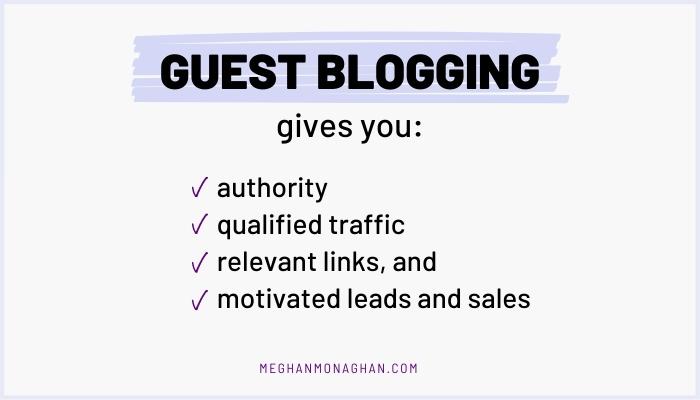
These opportunities translate to more authority, website traffic, social proof, and possibly sales in your business. Plus, you’ll widen your reach as you get in front of other people’s communities, which is key for business growth and lead generation.
No matter what stage your business is in, it’s always a good idea to connect with others. After all, success is often influenced by WHO you know versus WHAT you know. Influential people can really help you get ahead. (Look at Hollywood as an example.)

However, make sure these opportunities make sense for your business. There’s less value in getting in front of audiences that don’t align with your business. And, make sure your choices fit with your overall goals, brand, and vision.
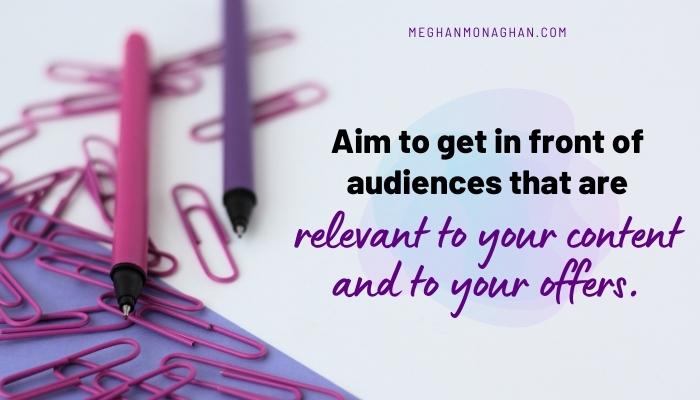
If you’re looking for opportunities, make your intentions known and be proactive. Use appropriate calls-to-action that encourage contacting you. For example, on your website’s contact form include a check box for inquiries pertaining to speaking, interview, and guest blogging. You can also reach out to websites, colleagues, and influencers.
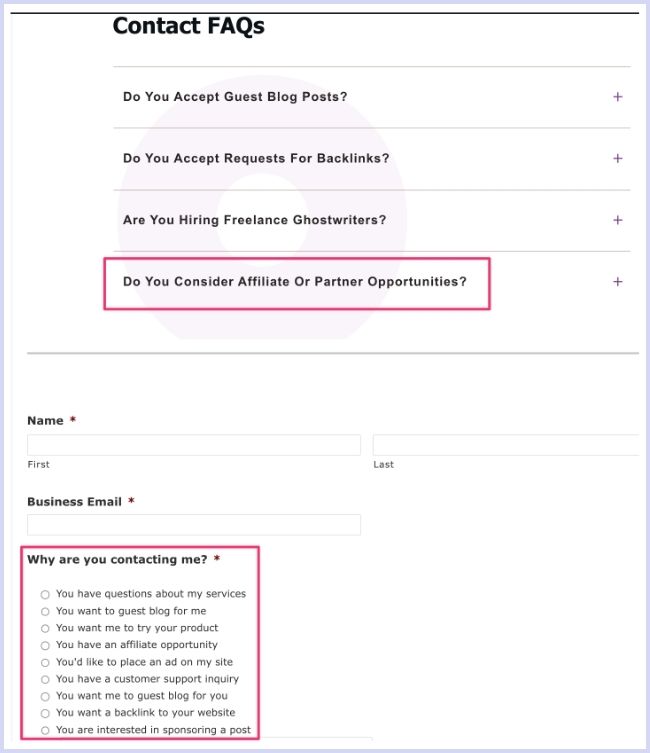
Combining different messages to different audiences within blog content can harm your results. So, ponder your strategy first!
This business blogging goal is more about capitalizing on the content you’ve created for your customers rather than creating content topics specifically for partnerships. However, you can make the call based on your circumstances.
Business Blogging Goal #11: To Increase Repeat Buyers and Retain Customers
As much as your existing customers and clients love you, there’s always the likelihood of your relevancy dropping off after someone purchases. Blogging helps to keep your business top of mind and participating in the current conversations. You want people coming back for more!
“Loyal customers, they don’t just come back, they don’t simply recommend you, they insist that their friends do business with you.” – Chip Bell (Source)
Typically, most businesses focus on broad “top of the funnel” content topics. However, you can utilize your blog content more strategically. Choose topics that will interest second time buyers.
For example, consider creating blog content that addresses the fourth and fifth stages in the buyer’s journey, which are retention and advocacy.
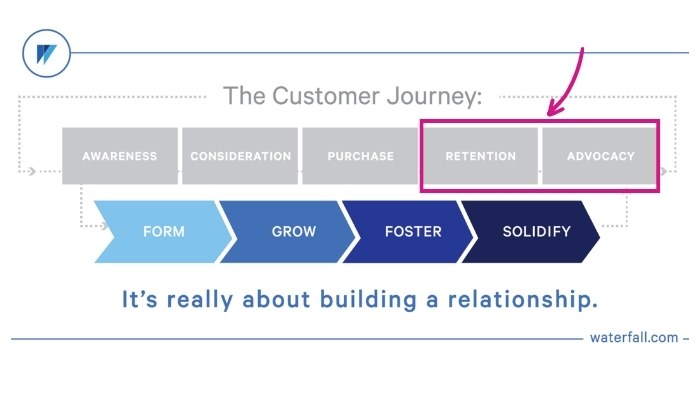
Audit your blog content and categorize each post as to whether it’s meant for top, middle, or bottom of the funnel readers. Use the data to determine your content needs and to identify topics for previous buyers by thinking about what comes next after people have purchased.
Also, include your blog in the plan for the follow-up AFTER a purchase is made, which will help support getting repeat business and creating loyal customers.
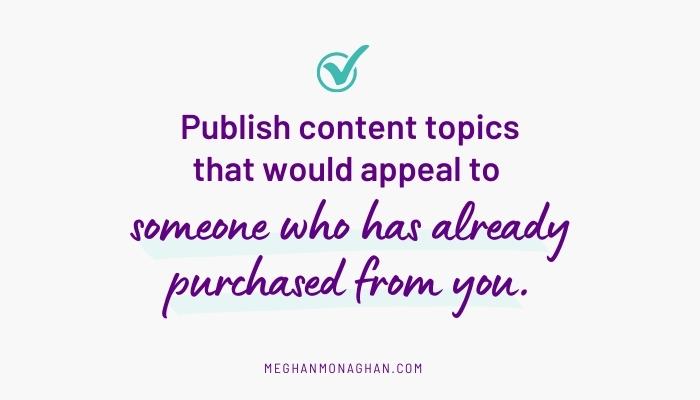
Your blog can be a critical asset for retaining customers and encouraging either repeat purchases or positive word of mouth marketing. If you’ve had trouble with churn, setting this one as a blogging goal may be worth it.
Make Your Business Blogging Goals S.M.A.R.T.
While these goals are all legitimate, I suggest choosing the ones you can measure. You’ll reach success more easily if you are able to set deadlines and metrics for each goal.
For this reason, I recommend setting blog goals that are SMART (Specific, Measurable, Attainable, Relevant, and Time-Bound).
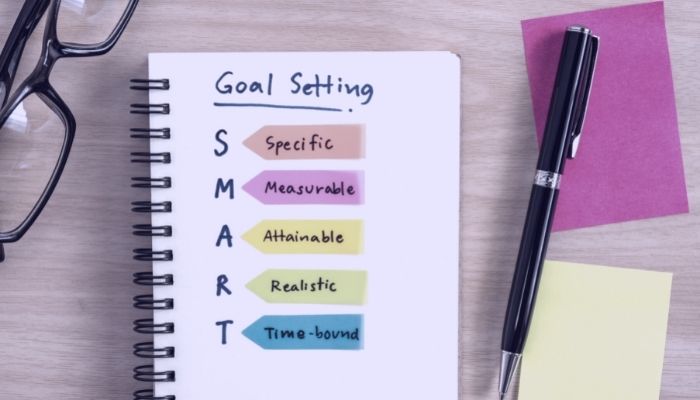
Goals are an integral part of any content strategy. Without goals, you’re aimlessly trying to hit a target that hasn’t been identified. In other words, when you don’t have goals, you won’t reach them.
Need Help Getting Started with Your Content Strategy and Blogging Goals?
Check out this episode we did on the Messy Desk Podcast for how to get started with setting goals for your blog and business.
Set Business Blogging Goals to Guide Your Content Creation and Improve Your Marketing Results
Publishing a business blog can be an asset to your marketing endeavors. But, you’ll be most effective when you set goals for your blog.
Business blogging goals identify why you’re creating content to help you understand what to publish. Hopefully, the goals above will assist you in managing your own blog strategy and plan.
If you need more help, check out the Content Profit Plan where I create a custom content strategy and calendar for your business blog.
Once you have a plan with goals, you can focus on creating content that contributes to the bigger picture in terms of your sales funnels.
One important aspect of blogging is its ability to build bonds and loosely connected relationships with your desired target audience. Today more than ever, people desire a human to human interaction. Thus, one of your unwritten goals should be to use a blog to form, build, and solidify a valuable connection with your ideal avatar.
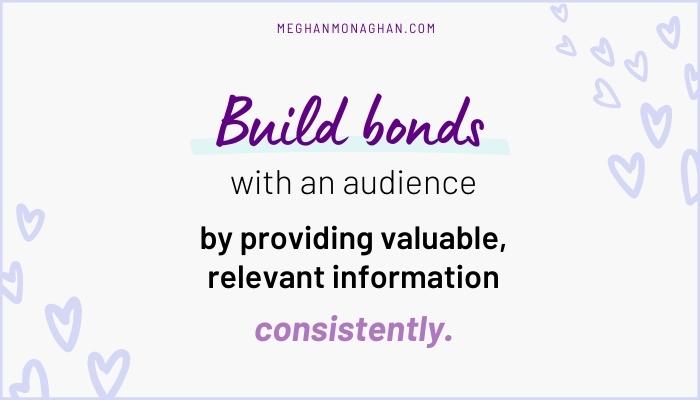
Don’t forget that blogging is only ONE type of content marketing that helps in the initial steps of your customer’s journey. There are others from which to choose! However, blogging continues to be one of the best long-term ways to achieve profitable content marketing as a small business.
If you ever feel like your blog isn’t contributing positively to your business, please let me know if I can help.
ORIGINALLY PUBLISHED JULY 12, 2017

A great post! A blog is indeed important. For me having a niche or coming up with things to write about is not an issue, but becoming better with SEO and converting leads is something I need to become better at. 🙂
Goal #1 and #4 to me are key and if done well will greatly impact the other goals. Establishing yourself as an expert without building relationships is like blogging simply because you want to be consistent and you feel you have to put something out there.
Thank you for this Meghan. I guess the biggest problem most business owners face is the fact that they do not have a blogging goal. Most of them think blogging is a way to keep their audience entertained ( which is true) but having goals and objectives paves a way for better results and conversions.
Yes, so true Apolline! Goals and objectives are good places to start on most things in business. But sometimes planning can be difficult!
This has given me some food for thought. I’ve been thinking about cutting out a few topics on my blog – either there just isn’t enough content, or the subject performs poorly. I find that it’s a bit tricky with “lifestyle” to stay in one wheelhouse, as the wheelhouse is huge! But I suppose it couldn’t hurt to take that wheelhouse down a bit.
I imagine a lifestyle blog is tricky! There are so many options…how do you know which to choose? Letting your audience guide your topics is smart and will improve your results indeed. It sounds as if you already analyze, so congrats on that! Thanks Jennifer, I appreciate the comment.
Megan,
Excellent article with all the tips here Especially about writing topics and how to establish yourslef as the thought lerader you are. It had so many tips I wrote them down and to make sure your article is interesting and has a good edge to the writing so it’s remembered.
Lori English
As a writer first, so much of this is relevant and yet the rest of it, I haven’t quite mastered yet. I rarely write with SEO only in mind. I know it is important, but I still find it counter to my own style of writing. Although, intuitively, I am using keywords, maybe just not ones that are the ‘perfect’ choices to optimize SEO.
There is so much to learn and to do to stay the expert we all want to be. I appreciate all your time and expertise you put into all of what you share, Meghan. You really show how much you care about helping and educating others to be the best they can in their space. Thank you!
I hear what you’re saying about SEO and writing! MANY people echo those same sentiments. I’m working on a few posts to help in this area. It’s not too hard to optimize for search while still appealing to humans. 😉 What a lovely compliment, Beverley, thank you so much! I appreciate you and your thoughtful comments. <3
This is a wonderful resource, Meghan. You’ve covered 8 great goals, and no matter if we are doing these, you’ve added given us, even more, to get better at.
There is so much useful information in this Meghan and you make is easy to understand the steps towards making your blog help your business. Organising your business blogging goals really helps to keep you focused on relevant topics.
Great list! I especially like your focus on the content supporting your business goals. I agree that you don’t have to sell for your blogs to support your plan. Thanks!
Meghan I can see why you are a successful leader in social media. There is so much for a business person to do to stay current. Many of us are serving clients and don’t have time to do what we could for our business. These are great ideas and I really appreciate all you share!
I feel your pain Candess, I really do! The fact is that very small business owners and entrepreneurs often take on the burden of doing everything in their businesses. I’m guilty of it too. We could get more done on our businesses if we simply hired other people to help us in our businesses, thereby increasing our income in the long run. I know it’s overwhelming to try to do all of it yourself! Thanks for your compliments and comment. 🙂